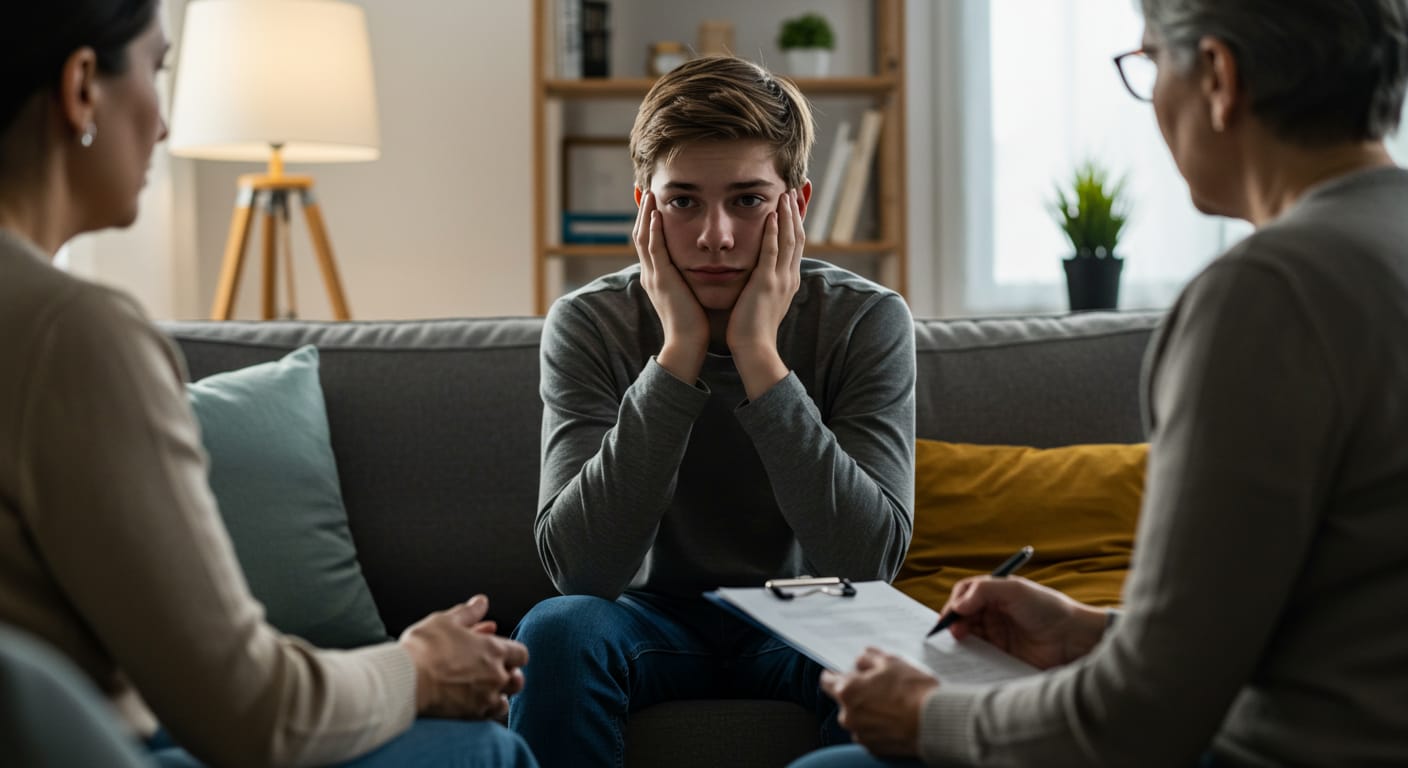Starting the Conversation That Could Save a Life
Let’s Talk About Clinical Depression – And Why It Matters
Talking about clinical depression is something that should start early in life. We’re often encouraged to express our emotions, but whether or not we feel comfortable doing so depends greatly on our upbringing, family dynamics, and culture.
You may have asked yourself:
“Will talking really help? Or will it just make things worse?”
Talking About Depression: Helpful or Harmful?
That depends.
Some people find real comfort and healing in verbal expression. Others find that constant talking about their problems can keep them stuck in pain, especially when there’s no shift toward solutions or hope.
Talking isn’t inherently good or bad—it’s how and why we do it that makes the difference.
Clinical Depression in Teens: When to Get Help
Major depression is more common in teenagers than many realize.
If your child shows signs of prolonged sadness, isolation, hopelessness, or drastic behavioral changes, these could be signs of clinical depression—and not just mood swings.
Important: Untreated depression in teens can lead to emotional, academic, and physical consequences that may follow them into adulthood.
Getting professional help early is critical. Therapy, medication, or support groups can dramatically change the outcome.
When Talking Can Help
There’s healing power in being heard.
Imagine it like a warm ray of sunshine in winter—gentle, affirming, and much needed.
Talk to someone you trust, like a friend, parent, mentor, teacher, or therapist. The right person will:
-
Listen without judgment
-
Offer real advice when needed
-
Encourage positive change
-
Help shift your focus from pain to solutions
-
Keep you grounded in reality and hope
“Talking won’t fix everything—but it can help you feel seen, understood, and less alone.”
When Talking Can Hurt (or Hold You Back)
Not all conversations are helpful.
Ask yourself:
-
Are you being honest with yourself and the person you’re confiding in?
-
Are these talks making you feel better, or just feeding your pain?
-
Are you focused on healing or stuck in a loop of despair?
-
Do you have a plan to start making changes?
Sometimes, not talking can be the right move if it gives you space to regroup and think clearly. Silence can be healing when it’s intentional—not when it becomes avoidance.
Talk With Purpose – Heal With Intention
Talking about depression isn’t about repeating the same story over and over.
It’s about using your voice to process, release, and move forward.
You don’t have to talk all the time.
You just have to start when it counts—with the right people and with the intention to heal.
Let your conversations lead to:
-
Self-awareness
-
Healthier coping
-
Better relationships
-
Action toward recovery
Final Thought: Make This Talk Count
Your mental health matters.
So talk with purpose. Cry if you need to. Ask for help if you’re struggling.
But most importantly, know this: You are not alone.



Great post. I really appreciate your take on this, as you are right most people will tell you talking about it/venting will help. I agree with you, and think we need to give ourselves permission to decide what is best for us, and that may mean not speaking about it all.
The first time I experience depression was last year while I was unemployed. It was really hard for me to talk about and often I felt like people couldn’t relate, but talking really did help me so I didn’t keep all of those emotions in.
Yaya, You are correct no one seems to want to to talk about depression …maybe too ashamed… makes me work harder to bring awareness to the massive.
Patrice this is a great post and I love how you break down when and when not to talk about it. I was raised to not really talk about your issues, that eventually they will pass, and I’ll be ok. Well “ok” never came and I had to seek professional help to deal with my issues and that was the best thing I could have done for myself. Great post!
Slobhan (Befree Project), Its time buried the myths about teenage depression
great post. Depression is one of those hard things to talk about. But I think it helps to have someone to talk to. Whether that person is someone you know or a professional. Just get help!
LaShawn, We are most comfortable to talk about depression to someone who have been in our shoes; Who is not going to judge us. Unfortunately its not easy to find someone to trust but we still need to step out of our comfort zone..
There used to be a time when I would keep my feelings and emotions bottled up on the inside. However, over the years I learned that talking about your feelings and how someone made you feel is very helpful. I also found journaling to be therapeutic and a form of release. Great informative post .
Like you brought out there’s no one right answer for every situation. As the bible says there’s a time to be quiet and a time that speak. (Ecc 3:7) Each individual has to make that choice for themselves.
LaShon, It”s a personal choice…Hopefully the teens are able to find that middle ground if not we as Parents need to help.
I know asking for help can be tough, but sometimes talking can definitely help. Thanks for helping to raise awareness.
It is difficult to address this issue of teenage depression. This is no laughing matter and kids who suffer from it should be given immediate attention. Thank you for raising awareness.
As a registered nurse I think it is great that you are giving your professional opinion. Many people suffer with depression and don’t know what steps to take to heal. I’m glad that you addressed the fact that there are many types of people and not a one size fot all answer.
Aidah, There are people who will class the mental ill in one category “CRAZY” (stigma )but its important to know not everyone that is sad is suffering from depression and vise versa. Thanks for your support
These are some really great tips for people dealing with clinical depression. You definitely need to feel comfortable with whomever you are speaking to about it.
I have never experienced depression, but whenever I feel angry or sad, venting helps. I used to just keep it to myself, but I realized that it’s better to release the emotions building up inside. After that, I feel a lot better.
Ourfamilyworld, Its good to talk it out and scream if you have to but don’t hold angry in not Healthy because angry is depression turn inside.
This is a great post. Depression is very difficult and hard to discuss, but it is good to know that speaking out/seeking help is being encouraged in the midst of all the stigma associated with it.
Valerie, People who are suffering from depression will always be stigmatize which lead depression to be one of the least desire or hidden topic amounts the younger generation.
I agree you have to be ready to talk about it. Most times it’s a big relief not to carry a burden alone.
I think this is such a personal issue, and each of us will have a different take on it. I am a talker, so I would feel comfortable talking about depression, while I know others may not. Great post!
This is really helpful. I never really know how to approach it when I know someone suffers from depression.
This is seriously good advice. It is important to take time to talk to our kids and to really listen to what is going on.
I appreciate you for always keeping these very important issues at the forefront Patrice. Thanks for the great tips on dealing with depression.
Seriously good advice indeed. Life saver for some too. Thanks for this.
I think you’ve raised some good points here. I found that talking really helped, but it never helped my dad when he suffered.
I never realized that people may hold on to something that is difficult because the thought of having nothing would be worse. That is insightful.
I think venting is a good idea. You’re right though, only in small doses, for this and most things!
I find both talking and not talking to be helpful. Getting it out in the open helps. But then continuing to come back to my problems and talk about them repeatedly only makes me dwell and feel more stuck in the situation.
Chasing Joy, feeling stuck: You have to talk about it yes, but you have to let in go…do not dwell on your issues if you want to move forward.
I always enjoy your post and I learn so much. While I don’t suffer from depression I don’t like to discuss my issues with other people. I usually keep them to myself, oddly enough I am a shoulder for many.
This gives me something to think about.
Mimi “MimiCuteLips” Green, Great that you are good at listen …Never know when you may need that shoulder to lean on.
My husband goes through bouts of depression. Sometimes it definitely helps for him to talk out. Other times, keeping himself busy really pulls him out of it works good, too.
Stephanie, Talking help sometime if person continue dwelling on his problems then we need to look at another approach.
I think the key is who you’re talking to about it. You’d want to discuss with someone who is genuinely attentive and understanding, and who will just listen.
Maria, You are right having someone you trust a person who is able to be attentive and understand your sensitive issues.
Such wonderful advice for anyone going through this.It’s always important to make sure you notice if a friend needs help.
Thanks for sharing this. Such an important issue and really great action/thinking steps.
Such a brilliant post, and so insightful! Thanks for joining in with the Weekend Blog Share.
Single Mother Ahoy Thank you for continue support.
It is is an interesting topic to discuss. While I haven’t had to deal with this, I know that sharing your story is important!